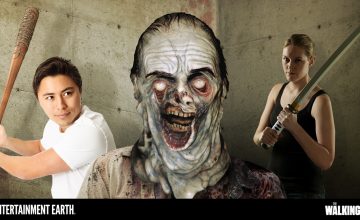THE MENACE IN QUESTION: The undead (who may be lacking in pulses, but not in moral compasses).
THE THREAT: Surprise! There is no threat here — these zombies are here to save the day! Unless, of course, you’re someone who deserves to get an undead thrashing…
FIRST APPEARANCE: George A. Romero’s Day of the Dead (1985).
The average zombie isn’t the sort of person you want to spend a lot of time with. They’re terrible conversationalists. Not exactly Rhodes Scholars. Their hygiene is atrocious.
And then there’s how they always try to eat everyone they meet.
But every so often there’s an odd banana in the bunch. A diamond in the rough. A bird of a different — okay, I swear I’ll stop with the clichés.
Something that’s not a cliché: a zombie hero. They’re still rare enough to stand out in a crowd and take us by surprise. For the most part, that’s okay: zombies should, nine times out of ten, be slavering monsters to be wary of. They’re much more potent allegories when they’ve got teeth that bite and clawed fingers that catch.
Still, I don’t begrudge the few shambolic heroes we’ve been given. The first of which is none other than my boy Bub, of Romero’s Day of the Dead.
Bub (Sherman Howard) is, at heart, a sensitive soul. He just wants to listen to classical music, read some Stephen King, and chomp on the meaty snacks his teacher/slavemaster Dr. Logan (Richard Liberty) provides for good behavior. He knows to salute when he sees a man in uniform, and he isn’t at all tempted to bite the hands that feed him.
The movie initially frames doctor Sarah (Lori Cardille), helicopter pilot John (Terry Alexander), and communications expert McDermott (Jarlath Conroy) as the “heroes” of the story, but in actuality Bub’s the character who truly acts in a heroic fashion.
While the three living heroes are busy fighting their way past hungry zombies and escaping the military base, Bub is the one to face the real villain of the piece, Captain Rhodes (Joe Pilato).
After Rhodes guns down Dr. Logan in a fit of rage, Bub comes upon the body and reacts with real anguish, moving from confusion to visceral grief when he realizes what’s happened to his teacher. It’s the first time a zombie ever shows real emotion and understanding.
Not long afterwards, he finds and shoots Rhodes — several, very satisfying, times — and gives him a mock salute just before the zombie’s hungrier brethren rip the sadist limb from limb. You get the sense that it’s a very bloody court martial being delivered for conduct unbecoming in the field. (Dismemberment and evisceration couldn’t have happened to a nicer guy.)
Given Day of the Dead‘s bleak message — that humanity has brought this zompocalypse upon themselves; that they’re far crueler and more violent than the zombies — it’s telling that Romero gives Bub the hero moment. Bub has managed to evolve past his zombie nature and come full circle, becoming a more ethical and proactive person than even the other humans. While the humans flee from their situation, Bub takes a stand.
It’s a theme Romero returns to in Land of the Dead, with the introduction of Big Daddy (Eugene Clark). As actor Clark himself says, Big Daddy is an “undead Black Panther”, rousing his fellow zombies to march on the last bastion of human society following a destructive attack on their own little community.
He’s dead, he’s tired, he’s mad as hell — and now heads are gonna roll.
By this point in the Dead series, zombies seem to be willing to “live and let live”, as it were. So long as the humans don’t enter their territory, they’re content to just meander through their empty routines in dead towns. But when the living do invade, shooting up zombies left and right before the undead can pose any sort of threat — that‘s the straw that breaks the camel’s back.
The humans in power in Land of the Dead are immoral, racist, and live in luxury while the poor struggle to survive — some are even forced to fight in gladiatorial bouts for the rich’s entertainment — and the zombies are senselessly tortured, mocked, and destroyed.
When Big Daddy and his zombie army begin tearing apart the fortified city of Fiddler’s Green, we cheer. This is the zombie revolution. An overthrowing of a totalitarian government. In the aftermath, justice has been served.
The titular hero of Fido (Billy Connolly) isn’t quite the revolutionary Big Daddy is — in fact, he’s still very much a slave, purchased by well-meaning housewife Helen (Carrie-Anne Moss) to do odd jobs around the house and serve as playmate/bodyguard/pet to precocious son Timmy (Kesun Loder).
In the alternate-1950s world of Fido, zombies are the result of radioactive comet dust that reanimates every dead body. Those who wish to stay dead have to have special “head coffin” funeral services, and those that rise again are promptly converted into an enslaved work force via control collars.
When Fido’s collar starts to malfunction, he at first reverts to his inherently violent zombie nature, eating a few unlikable neighbors. But as his friendship with Timmy grows and his new “master” treats him with unfailing kindness, Fido learns to control himself — and only acts violently with those who torment or threaten Timmy.
By film’s end, Fido has saved Timmy and Helen from a malicious ZomCon employee and earned their love and respect in return. No longer is he collared or treated like a dog/slave, but rather as an equal and member of the family. When Fido proves that not all zombies are a threat, the living have to reappraise their prejudices and the inhuman way they’ve been treating their reanimated dead.
Fido is Lassie, but with zombies. Just as Warm Bodies is a loose retelling of Romeo and Juliet but — again — with zombies.
Our hero, R (Nicholas Hoult), is a zombie who’s starting to remember bits and pieces of the world before the apocalypse. He knows in his unbeating heart that there has to be more than the stale, hungry routine he and his fellow zombies shuffle through.
After a hunt ends with him saving the life of a young woman, Julie (Teresa Palmer), R finds himself in a strange situation. After saving one human, he finds it harder to stomach hurting another. He attacks others of his kind to keep Julie safe; he even goes up against the Bonies: undead creatures the living and zombies both fear equally.
R then leaves the relative safety of his airport to get Julie home to her gun-happy, zombie-hating father (John Malkovich). And when a war between the Bonies and the living seems imminent, he and Julie take a stand right between the two.
Everyone knows zombies are irredeemable monsters; a zombie has never felt love, never dreamed, and has never been accepted by the living. But as R begins to do all of those things and reclaims more and more of his humanity, the effect Julie has on him spreads to the other zombies around them.
He becomes a most unique Patient Zero: a vector of life rather than disease.
R and the others are truly changing into something new. The message in Warm Bodies is clear: the zompocalypse was the final outcome of a society that had grown disconnected, hateful, and apathetic. Becoming a Boney is the final step before complete oblivion, but for those still in a zombie-state it’s still possible to regain their humanity. They can redeem themselves and make amends for their past crimes.
Some may find it sappy, but it’s true: love can heal a multitude of wounds. It certainly works for R.
In Liv Moore (Rose McIver)’s case in the show iZombie, it’ll take a bit more than love to cure her.
Turned zombie thanks to a party gone wrong — fun fact: drugs that turn drunken frat boys into flesh-eating monsters sucks the fun out of an event, no matter how good the DJ is — she’s able to manage her condition (and maintain her intelligence and communication skills) by regularly eating the brains of the dead who come through her morgue.
While her boss, Dr. Ravi Chakrabarti (Rahul Kohli), works on creating a cure for her condition, Liv discovers there’s an unexpected bonus to her newfound zombie “powers”: every time she ingests a brain, she temporarily absorbs some of the personality and abilities of the deceased. Since most of the brains she consumes come from murder victims, that gives her an edge catching their murderers.
Since she can’t very well openly announce her zombie state to the entire world (early on, Ravi is the only one privy to her secret), Liv passes herself off as a psychic to work alongside Detective Clive Babineaux (Malcolm Goodwin).
Every so often Liv’s zombie nature overwhelms her and she gets a wee bit violent; and it quickly becomes apparent that she’s not the only intelligent zombie in town. But this undead doctor-cum-detective is a hero by both dead and living standards, saving the lives of those she can and bringing justice to the murdered — after she snacks on their grey matter.
Hey, it’s not like they were using it anymore. And it’s all for a good cause. A girl’s gotta eat, after all.
Of all the zombie heroes, Liv’s the biggest standout: not only is she the sole lady of the bunch, she’s also the most human-like. She can still mix among the living and pass off as one of us, and thanks to her diet she retains all of her medical knowledge and social skills. She’s also the most likeable — probably because she doesn’t have the soggy skin and rotting limbs of her compatriots.
Just further proof that presentation is everything.
For the time being, zombie heroes remain few and far between. The ones we’ve had are all great in their own ways, but I’m glad they remain a rare breed: zombies will always be more fun when they’re a ravenous threat.









